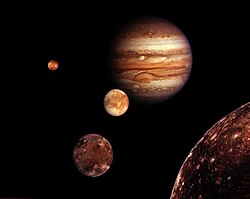148780 Altjira
 Altjira and its companion imaged by the Hubble Space Telescope in 2006 | |
| Discovery | |
|---|---|
| Discovery site | Deep Ecliptic Survey at Kitt Peak[1] |
| Discovery date | 20 October 2001 |
| Designations | |
| (148780) Altjira | |
| Pronunciation | /ælˈtʃɪərə/ |
Named after | Altjira |
| 2001 UQ18 | |
| Classical KBO (DES)[2] | |
| Orbital characteristics[1] | |
| Epoch 2025 May 05 (JD 2460800.5) | |
| Uncertainty parameter 4 | |
| Observation arc | 7,709 days (21.11 yr) |
| Aphelion | 47.11 AU (7.048 Tm) |
| Perihelion | 42.00 AU (6.283 Tm) |
| 44.55 AU (6.665 Tm) | |
| Eccentricity | 0.0573 |
| 297.40 yr (108626±31 d) | |
| 129° | |
| 0.003314°/day | |
| Inclination | 5.198° |
| 1.84° | |
| 1919 Feb 16 ± 37 days | |
| 304° | |
| Known satellites | 1 confirmed, 1 suspected |
| Physical characteristics | |
| 331+51 −187 km (combined) 246+38 −139 km (primary)[3] | |
| Mass | (3.952±0.067)×1018 kg (system)[4] |
Mean density | 0.30+0.50 −0.14 g/cm3[3] |
| 0.0430+0.1825 −0.0095[3] | |
| B−V = 0.91±0.13 V−R = 0.74±0.08 V−I = 1.17±0.09[5] | |
| 5.77;[1] 5.4 (system), 5.1 (primary) [6] | |
| Discovery | |
|---|---|
| Discovery date | 6 August 2006[6] |
| Orbital characteristics[4] | |
| 9904±56 km | |
| Eccentricity | 0.3445±0.0045 |
| 0.047139.561 d | |
| Inclination | 35.19 (retrograde) |
| Satellite of | 148780 Altjira |
| Physical characteristics | |
| 221+34 −125 km[3] | |
| difference from primary: 0.7 ± 0.2[6] | |
148780 Altjira appears to be a triple or contact-binary double classical Kuiper belt object.[6] The secondary is large compared to the primary, approximately 246 kilometres (153 mi) vs. 221 kilometres (137 mi).[3] The Altjiran lightcurve is quite flat (Δmag<0.10), which is indicative of a "quasi-spherical body with a homogeneous surface".[7] The system mass is 4 × 1018 kg.[4]
Its companion was discovered on 6 August 2006, from images taken by the Hubble Space Telescope.[8] The secondary's orbit has the following parameters: semi-major-axis, 9904 ± 56 km; period, 139.561 ± 0.047 days; eccentricity, 0.3445 ± 0.0045; and inclination, 35.19 ± 0.19° (retrograde). There is indirect evidence that Altjira may be an unresolved hierarchical triple system.[9]
In 2008, Altjira was named after the Arrernte creation deity, Altjira (Alchera).[1]
References
[edit]- ^ a b c d "JPL Small-Body Database Browser: 148780 Altjira (2001 UQ18)" (2022-11-28 last obs). Retrieved 2025-08-26.
- ^ Marc W. Buie. "Orbit Fit and Astrometric record for 148780". SwRI (Space Science Department). Retrieved 2011-11-29.
- ^ a b c d e Vilenius, E.; Kiss, C.; Mommert, M.; et al. (2014). ""TNOs are Cool": A survey of the trans-Neptunian region X. Analysis of classical Kuiper belt objects from Herschel and Spitzer observations". Astronomy & Astrophysics. 564: A35. arXiv:1403.6309. Bibcode:2014A&A...564A..35V. doi:10.1051/0004-6361/201322416. S2CID 118513049.
- ^ a b c Grundy, W. M.; Noll, K. S.; Nimmo, F.; Roe, H. G.; Buie, M. W.; Porter, S. B.; Benecchi, S. D.; Stephens, D. C.; Levison, H. F.; Stansberry, J. A. (2011). "Five new and three improved mutual orbits of transneptunian binaries". Icarus. 213 (2): 678. arXiv:1103.2751. Bibcode:2011Icar..213..678G. doi:10.1016/j.icarus.2011.03.012. S2CID 9571163.
- ^ Doressoundiram, A.; Peixinho, N.; Doucet, C.; Mousis, O.; Barucci, M. A.; Petit, J. M.; Veillet, C. (2005). "The Meudon Multicolor Survey (2MS) of Centaurs and trans-neptunian objects: extended dataset and status on the correlations reported". Icarus. 174 (1): 90–104. Bibcode:2005Icar..174...90D. doi:10.1016/j.icarus.2004.09.009. S2CID 122936619.
- ^ a b c d Johnston's Archive on (148780) Altjira Retrieved 2011-11-29
- ^ Duffard, R.; Ortiz, J. L.; Thirouin, A.; Santos-Sanz, P.; Morales, N. (2009). "Transneptunian objects and Centaurs from light curves". Astronomy & Astrophysics. 505 (3): 1283–1295. arXiv:0910.1472. Bibcode:2009A&A...505.1283D. doi:10.1051/0004-6361/200912601.
- ^ "IAU Minor Planet Center". minorplanetcenter.net. Retrieved 2025-09-03.
- ^ Nelsen, Maia A.; Ragozzine, Darin; Proudfoot, Benjamin C. N.; Giforos, William G.; Grundy, Will (March 2025). "Beyond Point Masses. IV. TNO Altjira is Likely a Hierarchical Triple Discovered Through Non-Keplerian Motion". The Planetary Science Journal. 6 (3): 53. arXiv:2403.12786. doi:10.3847/PSJ/ad864d.

